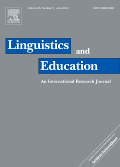
Linguistics and Education
Scope & Guideline
Unlocking the Power of Language in Educational Settings
Introduction
Aims and Scopes
- Multilingual and Multimodal Pedagogies:
The journal emphasizes the significance of multilingualism and multimodal approaches in education, advocating for teaching methods that incorporate multiple languages and modes of communication to enhance learning outcomes. - Language Assessment and Literacy:
A core area of focus involves investigating language assessment practices and literacy development, particularly how they relate to diverse learner backgrounds, including bilingual and multilingual students. - Cultural and Linguistic Diversity:
Research in this journal often highlights the importance of recognizing and integrating cultural and linguistic diversity within educational contexts, addressing how these factors influence teaching and learning dynamics. - Critical Language Studies:
The journal promotes critical perspectives on language education, including discussions on language ideologies, power dynamics, and the socio-political implications of language policies in educational settings. - Teacher Development and Agency:
An emphasis is placed on the professional development of language educators, exploring how their beliefs, practices, and identities shape classroom interactions and learning environments.
Trending and Emerging
- Translanguaging Practices:
Research on translanguaging has gained significant traction, emphasizing how multilingual students use their full linguistic repertoire in learning. This approach fosters inclusivity and recognizes the fluidity of language use in educational settings. - Culturally Sustaining Pedagogies:
There is an emerging focus on culturally sustaining pedagogies that aim to maintain and enhance students' cultural identities while promoting academic success, reflecting a growing recognition of the importance of cultural context in language education. - Digital Literacies and Online Learning:
With the rise of online education, studies exploring digital literacies and their implications for language learning are trending. This includes the examination of how technology mediates language practices and learning experiences. - Social Justice and Equity in Language Education:
A strong trend towards addressing social justice and equity issues within language education is evident, with researchers critiquing systemic inequalities and advocating for more equitable educational practices. - Emotional and Affective Dimensions of Language Learning:
Emerging studies are increasingly focusing on the emotional and affective dimensions of language learning, exploring how emotions influence learning processes and outcomes in diverse educational contexts.
Declining or Waning
- Traditional Language Teaching Methods:
There is a noticeable decline in studies focusing on traditional, monolingual language teaching methods, as the field increasingly shifts towards more dynamic, inclusive, and context-sensitive pedagogical approaches. - Standardized Testing:
Research centered on standardized testing practices is becoming less frequent, as the journal's focus moves toward more holistic and formative assessment strategies that consider diverse learner needs and contexts. - Language Acquisition Theories:
While foundational language acquisition theories remain important, there is a waning focus on purely theoretical discussions, with more emphasis now placed on practical applications and classroom implications. - Deficit Perspectives on Language Learners:
The journal is moving away from deficit-based perspectives that characterize language learners as lacking, instead promoting asset-based views that recognize the strengths and resources that multilingual and diverse learners bring to educational settings. - Isolated Language Studies:
There is a declining interest in research that examines languages in isolation, with a growing trend toward interdisciplinary studies that connect language education to broader social, cultural, and political contexts.
Similar Journals
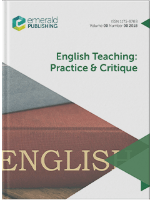
English Teaching-Practice and Critique
Navigating the Landscape of English Teaching with Critical PerspectivesEnglish Teaching-Practice and Critique is an esteemed journal published by Emerald Group Publishing Ltd, focusing on the interdisciplinary fields of Education and Linguistics. With a commitment to advancing knowledge and practice in English language teaching, the journal offers a platform for innovative research, critical reflections, and practical insights that are vital for educators, researchers, and students alike. The journal has established itself in the academic community, achieving a Q3 ranking in Education and a prestigious Q1 ranking in Linguistics and Language as of 2023, highlighting its impact and relevance. Although not an open-access journal, its curated content remains accessible to a global audience, facilitating meaningful discourse and development in English language education. The journal spans articles from 2008 to 2014 and 2016 to 2024, making it a valuable resource for ongoing scholarly dialogue and pedagogical advancement. It is particularly recognized within Scopus rankings, standing at the 76th percentile in Arts and Humanities as well as the 74th percentile in Social Sciences, underscoring its significance and standing in these domains.

English Teaching and Learning
Pioneering Strategies for Effective English Language InstructionEnglish Teaching and Learning is a distinguished academic journal published by SPRINGER SINGAPORE PTE LTD, focusing on the dynamic fields of education and linguistics. With an ISSN of 1023-7267 and an E-ISSN of 2522-8560, this journal serves as a vital platform for researchers, educators, and practitioners interested in advancing the understanding of English language instruction and learning methodologies. Recognized for its high standards, it has achieved a notable Q2 ranking in Education and a prestigious Q1 ranking in Linguistics and Language in 2023, underscoring its impact within these essential scholarly fields. The journal, which spans a converged publication period from 2015 to 2024, endeavors to disseminate innovative research, theoretical insights, and practical applications, making it an invaluable resource for anyone committed to enhancing English education globally. Although it does not operate under an open-access model, its contributions are pivotal in shaping contemporary discourse in English teaching and learning.
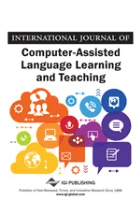
International Journal of Computer-Assisted Language Learning and Teaching
Pioneering research at the intersection of language and tech.Welcome to the International Journal of Computer-Assisted Language Learning and Teaching, a premier publication by IGI Global dedicated to advancing the interdisciplinary research at the intersection of linguistics, education, and computer science. With an ISSN of 2155-7098 and an E-ISSN of 2155-7101, this journal aims to provide a platform for innovative studies on the implementation and effectiveness of technology in language learning and teaching. The journal has earned notable recognition within its field, securing a Q1 ranking in Linguistics and Language and strong placements across several categories in the 2023 Scopus Ranks, including a Q3 classification in Computer Science Applications and Computer Vision and Pattern Recognition. Researchers and educators are encouraged to contribute their findings to foster dialogue around effective computer-assisted methodologies and instructional practices. Although the journal is not open access, it remains a vital resource for researchers, professionals, and students seeking to enhance the efficacy of language education through technological innovation.

Australian Journal of Language and Literacy
Illuminating the pathways of language and literacy education.The Australian Journal of Language and Literacy, published by SpringerNature, is an esteemed platform for advancing research in the fields of linguistics, language, and education. With an ISSN of 1038-1562 and an E-ISSN of 1839-4728, this journal has been a crucial resource since its inception in 1997, now converging into its 2024 volume. It proudly holds a significant position within the Q2 category in Linguistics and Language and a Q3 classification in Education for 2023, reflecting its commitment to high-quality scholarly content. With impressive Scopus rankings in arts and humanities and education, it engages a diverse audience of researchers, educators, and linguists. Although this journal is not open access, it remains an essential resource for those seeking to enhance their understanding of language acquisition, literacy development, and pedagogical approaches. By contributing to the discourse in these vital areas, the Australian Journal of Language and Literacy plays a pivotal role in shaping the educational landscape in Australia and beyond.
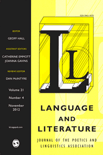
Language and Literature
Fostering Dialogue Across Language and Literary DisciplinesLanguage and Literature is a premier academic journal published by SAGE Publications Ltd, focusing on the dynamic interplay between linguistics, literature, and literary theory. Established in 1996, this prestigious journal holds a distinguished position within the academic community, reflected in its Q1 ranking in both Linguistics and Literature & Literary Theory as of 2023, placing it among the top journals in its field. With a robust impact demonstrated by its high Scopus rankings—ranked #24 out of 1106 in Literature and Literary Theory and #219 out of 1088 in Language and Linguistics—Language and Literature provides a vital platform for innovative research and discourse, particularly relevant for scholars and practitioners aiming to explore cutting-edge developments in language studies and literature. While the journal does not currently offer Open Access options, its comprehensive and scholarly publications continue to contribute significantly to the advancement of knowledge and understanding in these interdisciplinary fields. We invite researchers, professionals, and students to engage with our content and contribute to the vibrant dialogue that shapes our understanding of language and literature.
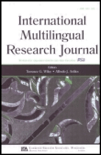
International Multilingual Research Journal
Empowering researchers to expand the horizons of multilingual studies.The International Multilingual Research Journal, published by Routledge Journals, Taylor & Francis Ltd, is a leading platform for the dissemination of innovative research in the fields of Education and Linguistics. With an impact factor reflecting its rigorous academic standards and a Q1 ranking in both relevant categories, this journal is dedicated to advancing the understanding of multilingualism and its implications globally. It serves as an essential resource for researchers, educators, and practitioners who seek to explore the complexities of language and learning across diverse cultural contexts. Since its inception in 2010, the journal has converged a wealth of scholarly articles that address contemporary issues in language use and pedagogical practices. The journal adheres to the highest research integrity standards and promotes open dialogue among scholars, making it a vital tool for those engaged in this expanding field. With its strong positioning in prestigious databases like Scopus, the International Multilingual Research Journal is committed to enriching the academic community and fostering interdisciplinary collaborations.
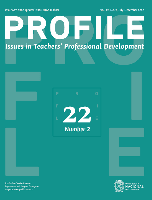
Profile-Issues in Teachers Professional Development
Empowering Teachers: Navigating the Future of Professional DevelopmentProfile - Issues in Teachers Professional Development is a distinguished open access journal published by the Universidad Nacional de Colombia, Facultad Ciencias Humanas, aimed at fostering research and discourse surrounding critical issues in educators' ongoing professional development. Since its inception in 2005, the journal has established itself as a significant resource within the fields of Education and Linguistics and Language, reflecting its relevance through its category quartiles, being positioned in Q3 in Education and an impressive Q1 in Linguistics and Language for 2023. The journal boasts a commendable Scopus ranking, reflecting its impact and commitment to advancing scholarly discussion, with rankings of #236 out of 1167 in Linguistics and Language, and #818 out of 1543 in Education. With a converged timeline from 2018 to 2024, it serves as a vital platform for educators, researchers, and students alike, encouraging the dissemination of innovative practices and insights essential for the evolution of teacher training and professional growth in a rapidly changing educational landscape.
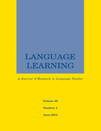
LANGUAGE LEARNING
Pioneering pathways in language learning research.LANGUAGE LEARNING is a premier academic journal dedicated to advancing the field of language acquisition and education, published by Wiley. With a foundation dating back to 1948, the journal has carved an esteemed niche in the academic landscape, currently holding a prestigious Q1 rank in both the categories of Education and Linguistics and Language. It proudly occupies the 9th percentile rank in the Arts and Humanities domain and the 10th percentile in Social Sciences, illustrating its influence and reach. The journal publishes high-quality research that explores various dimensions of language learning, from cognitive processes to pedagogical approaches, making it an essential resource for researchers, educators, and students alike. Although Access options are non-open, the journal remains accessible to a wide audience, reinforcing its commitment to disseminating critical insights within the academic community.
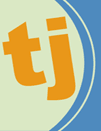
TESOL Journal
Advancing the Art of Language EducationTESOL Journal, published by Wiley, is a premier academic journal dedicated to advancing the field of Teaching English to Speakers of Other Languages (TESOL). With an esteemed reputation reflected in its high impact factor and its Q1 ranking in both Education and Linguistics and Language categories for 2023, this journal serves as a critical resource for researchers, educators, and policy-makers. It covers a wide spectrum of topics related to language acquisition, pedagogical innovations, and educational strategies in TESOL, contributing significantly to the discourse around multilingualism and effective teaching practices. The journal is notable not only for its rigorous peer-review process but also for its commitment to disseminating high-quality research that informs and inspires practice in diverse educational settings. Interested readers can access articles through traditional subscription methods, ensuring that groundbreaking research is available to a broad audience. With converged years spanning from 2010 to 2024, TESOL Journal continues to evolve, making it a vital publication for anyone interested in the complexities of language education.
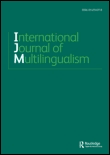
International Journal of Multilingualism
Advancing the frontiers of multilingual research.Welcome to the International Journal of Multilingualism, a leading platform dedicated to advancing the field of linguistics and language studies. Established by ROUTLEDGE JOURNALS, TAYLOR & FRANCIS LTD and housed in the United Kingdom, this journal has rapidly ascended to a prestigious Q1 quartile status in both the Linguistics and Language categories as of 2023, ranking in the top 4% across related disciplines. With a remarkable Scopus ranking of #35 in Arts and Humanities and #38 in Social Sciences, it is recognized for publishing high-quality, impactful research that spans a diverse array of multilingual topics. The journal thrives on its commitment to examining the complexities and dynamics of multilingualism in contemporary society, making it an essential resource for researchers, professionals, and students alike. Although Open Access options are not currently available, the journal's rigorous peer-review process ensures that each publication contributes valuable insights into the field. Since its inception in 2004, the International Journal of Multilingualism continues to foster academic discourse and innovation, solidifying its role as a crucial outlet for scholarly work by 2024 and beyond.